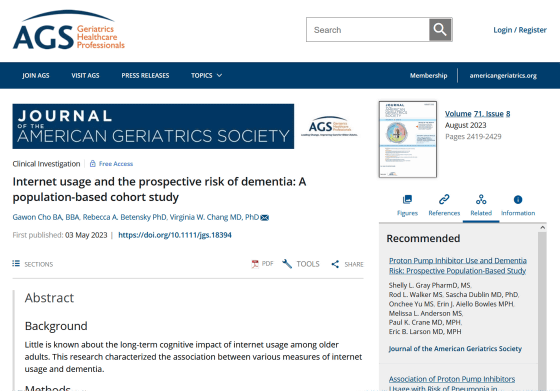Research shows that elderly people who frequently use the internet have an overwhelmingly low risk of dementia

Discussions about Internet use primarily focus on children and adolescents, but in recent years more and more middle-aged and older people are using the Internet on a daily basis. A study that followed middle-aged and elderly people without dementia reported that ``elderly people who use the Internet have a lower risk of developing dementia.''
Internet usage and the prospective risk of dementia: A population-based cohort study - Cho - 2023 - Journal of the American Geriatrics Society - Wiley Online Library

Regular internet use may be linked to lower dementia risk in older adults, study says | CNN
https://edition.cnn.com/2023/05/03/health/internet-use-dementia-risk-wellness/index.html
Older adults who regularly use the internet have half the risk of dementia compared to non-regular users
https://www.psypost.org/2023/09/older-adults-who-regularly-use-the-internet-have-half-the-risk-of-dementia-compared-to-non-regular-users- 183597
Enjoying the variety of content available on the Internet and communicating with others through the Internet may stimulate the brains of older adults and help maintain cognitive function. In fact, past research has shown that older Internet users have better overall cognitive abilities compared to non-Internet users.
On the other hand, past studies have barely tracked changes over time, or even if they have, it has been very short-term. Therefore, a research team at New York University School of Medicine conducted a study to find out how regular Internet use is associated with the risk of dementia in older adults, and whether the effects change depending on the amount of time spent using the Internet.
The research team used data from a survey called the Health and Retirement Study , which targeted middle-aged and elderly people aged 50 and older living in the United States. The survey tracked a total of 18,154 subjects born before 1966, and included survey items such as frequency of Internet use and symptoms of dementia.

In 2002, the Health and Retirement Study asked, 'Do you regularly use the Web or the Internet to send or receive e-mail, shop online, look for information, book travel, or for other purposes?' Every two years starting in 2015, we interview people about their use of the Internet. Participants also reported their average daily Internet usage time. Furthermore, symptoms of dementia were also evaluated every two years by telephone interview. The data collection period was between 2002 and 2018, with subjects aged 50 to 65 years at the start of the study, and a median follow-up of 8 years.
A summary of the survey results revealed that 65% of the subjects used the Internet regularly, and 35% were irregular Internet users. 21% changed their internet usage habits during the study period, 53% remained the same, and the remaining 26% lost contact for some reason during follow-up, developed dementia, or died. He said he did. 5% of the subjects developed dementia during the study, and 8% were excluded from the study due to death or other reasons.
When these survey results were combined with demographic data, middle-aged and older people who were Internet users at the start of the study had a 1.54% risk of developing dementia, while irregular Internet users had a 10.45% risk. did. When the survey was limited to people with no signs of dementia at the start of the study, the risk of developing dementia among Internet users was 62% of that of non-regular Internet users, which means that those who use the Internet regularly have a higher risk of developing dementia. was shown to be low.
In addition, looking at the relationship with internet usage time, the group with the lowest risk of dementia was those who used the internet for 6 minutes to 2 hours per day, and those who used the internet for more than 2 hours were gradually at risk of developing dementia. There was a tendency for the risk to increase.

This study only shows the relationship between Internet use and dementia risk, and it does not specify the mechanism by which Internet use reduces the risk of dementia. However, study co-author Virginia Chang , an associate professor at New York University, said, ``Online engagement helps develop and maintain 'cognitive reserve,' which helps to protect the brain from age-related cognitive decline. It may be possible to compensate for aging and reduce the risk of dementia.'
Related Posts:
in Science, Posted by log1h_ik







